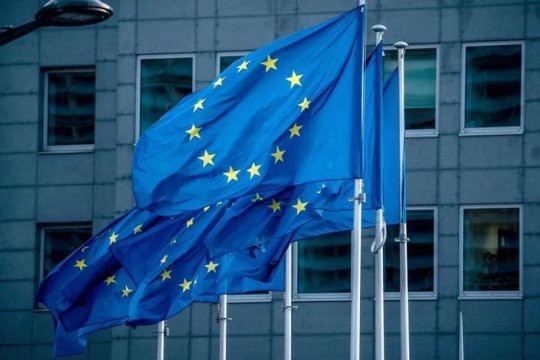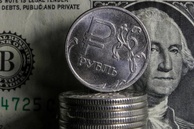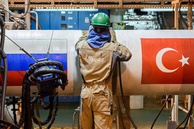According to a Bloomberg report, by mid-December, just ahead of the EU summit the European Commission plans to unveil a “plan for the use” of Russian Central Bank’s assets frozen in the EU countries after February 2022. Statements about the desire or intention to use these funds, or part of them, “for the restoration of Ukraine” have been heard in the West since the spring of 2022. There is a bunch of legal and political obstacles that such intentions may snag on though.
After the start of Russia’s special military operation in Ukraine, the United States, Britain, Canada, Japan and the European Union froze the gold and foreign exchange reserves of the Russian Federation held in their jurisdictions. In March 2022, Russian Finance Minister Anton Siluanov estimated the size of Russian assets frozen by the West at “about $300 billion” of the total volume of this country’s gold and foreign currency reserves of “around $640 billion.” [i] As of September of 2023, Bloomberg estimated the volume of seized Russian reserves at $311 billion, and the seized assets of Russian individuals and companies - at 19 billion euros. Just under $9 billion of private funds were seized in Switzerland. [ii] At the same time, the US Treasury Department estimated the total volume of seized Russian sovereign assets at $280 billion, noting that theoretically, Washington alone could confiscate about $5 billion of Russian funds. According to the European Commission, at the beginning of December we are talking about 211 billion euros seized in EU countries, most of which belong to the Russian Central Bank.
Proposals to use the frozen Russian assets to provide “in one way or another, assistance to Ukraine” started springing up already in spring 2022, and in mid-May 2022, the head of the European Commission, Ursula von der Leyen, said that the EU was “looking for ways to use these assets to rebuild Ukraine.” Essentially, the idea of using seized assets and property of Russian businessmen to finance Kyiv was supported also by US President Biden.
From a legal perspective, a confiscation of funds belonging to private individuals included in the Western countries’ sanctions lists is a long-established practice, and the initiators apparently see no political risks for themselves. Last December, the US Senate voted for an amendment to the state budget law, which allows the transfer of property of Russian entrepreneurs, confiscated by US authorities, “for humanitarian and military assistance to Ukraine.”[iii] In January 2023, experts of the Russian International Affairs Council said that the Canadian authorities “have already launched the process of arresting and confiscating the assets of businessman Roman Abramovich,” who came under Canadian sanctions in March 2022. Ottawa was going to confiscate $26 million and “use the funds to restore Ukraine.” In February 2023, US Attorney General Garland announced that $4.5 million of Russian businessman Konstantin Malofeyev, seized in the US would be handed over to Kyiv.
According to the US television network CBS, as of early September 2023, the US authorities had “confiscated or facilitated the seizure” of assets of Russian individuals amounting to $1 billion “around the world.” Deputy Attorney General Lisa Monaco told CBS that the federal government is "working with Congress to obtain authorization to use these funds for the benefit of the Ukrainian people." Finally, in early December, European Commissioner for Justice and Rule of Law Didier Reynders told the media that the EU was “discussing the potential possibility of confiscating, by court order, private Russian assets if their owners are proven to be circumventing EU sanctions.” We are talking about part of the 28 billion euros, estimated by Reynders as the amount of funds of private individuals from the Russian Federation arrested in the EU.
State assets are a different matter though. In July 2023, The Economist wrote that political speculation regarding the possibility of confiscation of seized assets of the Russian Federation rests on the provisions of international law, which provides no clear-cut way to seize such assets without a vote in the UN Security Council, a judgment by the International Court of Justice or a post-war settlement. Each of those would require Russia’s agreement.
Any unilateral seizure of Russian state assets would be a clear violation of international law. States are immune from the legal jurisdiction of other countries and from expropriation of their property for the purpose of debt repayment. According to international law, sanctions against Russia are permissible only as a means of inducing it to take different actions. Simple asset confiscation would go beyond what global regulations allow.
“The rules on countermeasures contain a fine balance between what states need to be allowed to do to protect themselves and their rights, and the risk of abuse, especially by powerful states,” The Economist quotes a Cambridge international law scholar as saying. She adds that “such measures must be temporary, as far as possible reversible and intended as a means to change behavior, not as punishment.”
In October, Canadian Senator Ratna Omidvar proposed an amendment to the Special Economic Measures Act (SEMA), which would allow the confiscation of assets of the Russian state “for the purpose of rebuilding Ukraine.” [iv] The Act, adopted in 1992, allows Canada to impose unilateral sanctions “directly against foreign countries.” From the outset, “a serious breach of international peace and security that has resulted or is likely to lead to a serious international crisis” was mentioned as one of the grounds for introducing such sanctions. [v]
The European Commission’s draft plan sets much more “modest” goals: it concerns the so-called “unforeseen profits from the assets of the Russian Central Bank frozen in the European Union,” which, according to Bloomberg, will amount to about 3 billion euros by the end of 2023. “Unforeseen,” since the source of profit was a change in ECB interest rates, which led to an increase in the yield on placed deposits to an annual 4 percent. At the same time, the authors admit that solutions to “some issues” have not yet been found, and the final version of the initiative will have no impact on the tax legislation of EU member states.
When the first details of this “plan” transpired in September, it received a nod also from US Treasury Secretary Janet Yellen. At the same time, Belgian Prime Minister De Croo promised the Ukrainian authorities to transfer 1.7 billion euros “received in the form of taxes on income from frozen Russian assets.” The Euroclear depository, located in Belgium, holds the lion's share of the Russian Central Bank’s frozen assets, estimated at about 180 billion euros. These assets continue to generate income, which the advocates of this “scheme” argue could be taxed at a higher rate—up to 100 percent. Later, however, it became known that both Belgium and Luxembourg, where another clearinghouse currently holding frozen Russian assets, Clearstream, is located, want EU and G7 assurances that they will not have to bear all the legal and financial risks associated with such an unprecedented step. [vi]
In the European Union, the proposal to tax frozen Russian assets still raises legal and financial objections from a number of states, and disputes among member countries have been going on for more than a year now. Even though the format of “introducing a tax on the income of private firms owning frozen Russian assets” is considered “the most legally justified,” leading EU countries, including Germany, France and Italy, as well as the European Central Bank, require to start by drawing up a document “guaranteeing the legal purity of such measures and not jeopardizing financial stability.”
The ECB fears that even the use of interest proceeds from frozen assets could prompt other central banks to “turn their backs” on the euro, all the more so if the EU acts unilaterally without the other G7 countries. The consequences could be quite significant: a transfer of reserves from euro-denominated assets, an increase in borrowing costs for European companies, and diversification of trade. In a recent report, Bank of America analysts noted that the end result of turning the US dollar into a sanctions weapon could be the loss of its role as the main world currency. [vii]
To “share responsibility,” the EU agreed the proposed measures with the G7. In July, the G7 issued a statement according to which Russian assets would be frozen “until Russia compensates for the damage it caused Ukraine.” A joint statement issued during the US-EU summit held in late October 2023, stated that as part of assistance to Ukraine in the short term, the EU will explore the possibility of transferring to it the income of private companies from frozen Russian assets.” [viii] Those who criticize the EU and the G7 “for foot-dragging” are confident “that any reputational damage has already been done.” Realists, in turn, point out that if the investment of the seized assets of the Russian Central Bank brings losses, these losses will have to be made up for by European taxpayers.
According to Politico.eu, in early December, Spain, which holds the EU’s six-month rotational presidency, proposed considering an “extended version” of the “European Commission plan.” Madrid believes that by the end of 2027, the profits from the Russian Central Bank’s confiscated assets will amount to 15-17 billion euros. Therefore, it proposes sending this money to Ukraine, thus partially replacing the allocations originally intended for these purposes in the EU budget. This is exactly how the Spanish initiative was interpreted by some anonymous Politico sources familiar with the course of the preliminary discussion. According to them, a number of EU countries rejected the proposal out of hand, arguing that such a “scheme” would significantly slow down financial assistance to Kyiv. [ix]
The cautious response by European politicians and officials is quite understandable. The European Union is trying to preserve in the eyes of non-Western countries the remnants of its reputation as one of the “poles” of “working according to the rules” and legal order. There are geopolitical considerations too. First, Western politicians and lawyers fear that by confiscating Russian state assets right now, the United States and the EU will lose “the last potential levers of influence” on Moscow’s policy in Ukraine. Secondly, the principle of inviolability of state assets protects the largest EU country, Germany, from claims by victims of the Nazi occupation. Ten years ago, the International Court of Justice ruled that Italian and Greek courts could not award German government assets to plaintiffs in such cases. Therefore, Germany will hardly agree to undermine its state immunity.
The striking contrast between the decisive statements made by Washington and Brussels and the deliberate caution of their practical steps regarding the seized assets of the Russian Central Bank reflects the following trends: first, this is an obvious crisis of the sanctions policy, which even Western observers now recognize; secondly, Russia's decisive, tough and consistent response to the seizure of its assets is contributing to serious changes in the global financial system. Moscow has form the very start considered the asset freeze as illegal. At the end of May 2022, President Vladimir Putin called the West’s actions “theft of other people’s assets.” [x]
Meanwhile, more and more countries worldwide are rejecting the policies of the United States and the European Union, based on endless threats to “disconnect” the “offenders” from Western financial mechanisms and resources. In the West, a kind of “sanctions industry” has already emerged, requiring more and more repressive measures. Small wonder that the idea of abolishing the dollar or euro “switch” is getting increasingly popular around the world. In such conditions, even an attempt to institutionalize the appropriation of assets of the Russian Federation could bring about the end of the Western-centric international financial system.
The views of the author are his own and may differ from the position of the Editorial Board.
[i] https://www.rbc.ru/economics/13/03/2022/622dd6ee9a7947081b63341c
[ii] https://www.reuters.com/world/europe/swiss-have-frozen-88-bilion-russian-assets-2023-12-01/
[iii] https://www.rbc.ru/rbcfreenews/64f523b59a79478d369d4c19
[iv] https://publications.gc.ca/collections/collection_2023/sen/YB441-278-1.pdf
[v] https://international-review.icrc.org/sites/default/files/reviews-pdf/2023-06/IRRC_916-917_RU_105-118_Interview_with_Elissa_Golberg.pdf
[vi] https://www.politico.eu/article/belgium-afraid-to-go-it-alone-on-seizing-russian-assets-profits/
[vii] https://internationalbanker.com/news/why-attempts-to-divert-frozen-russian-assets-could-seriously-damage-the-wests-credibility/
[viii] https://www.consilium.europa.eu/media/67448/us-eu-statement-final.pdf
[ix] https://www.politico.eu/article/plan-use-frozen-russian-assets-fund-ukraine-in-disarray/
[x] https://www.rbc.ru/politics/26/05/2022/628f5d879a7947b18342c982
read more in our Telegram-channel https://t.me/The_International_Affairs

 11:47 12.12.2023 •
11:47 12.12.2023 •



























